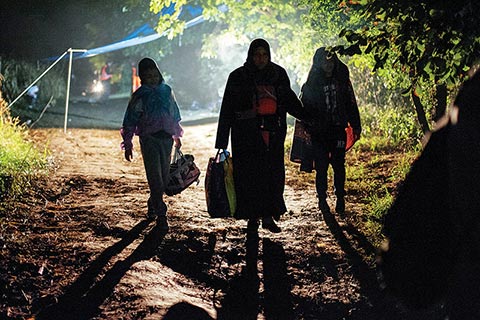Historically a nation that welcomes immigrants, Canada’s response to Syrian refugees and asylum seekers has been “pathetic,” says political science professor Randall Hansen. He spoke with Scott Anderson about how Western countries will need to refocus efforts on the Global South to resettle the millions of people worldwide who have fled their homes.
You note that almost 60 million people are displaced globally, including 20 million refugees – the highest since the Second World War. What’s causing this crisis?
Since the end of the Cold War, refugees have been fleeing unstable states and the collapse of entire states, such as Sudan, Ethiopia, Iraq, Libya and Syria. They are also fleeing repressive regimes, such as the Democratic Republic of Congo and Zimbabwe. It’s worth noting, too, that tens of millions of other people are choosing to leave their home countries. They are called survival migrants and they are fleeing poverty and hunger.
In the West, we often think of refugees as being a problem that starts “over there.” But you’ve pointed out that we actually have a hand in creating the problem. How?
The West decided to reorder the Middle East and North Africa and helped destroy particular states, leading to massive chaos. We broke it, we need to help fix it. But our obligations toward refugees stem from more than the fact that we helped create the problem. As a country, we have signed on to the international convention on refugees. It’s a matter of international law.
And how would you rate Canada’s response to the crisis?
Utterly pathetic. Canada likes to think of itself as one of the world’s great immigration countries and prides itself on taking international law seriously. Yet the number of Syrian refugees that the Harper government was talking about admitting – 10,000 – is tiny. Justin Trudeau has said his new government will accept as many as 25,000 Syrian refugees in the coming months. This is an improvement, but compare that to the 60,000 that we admitted after the Indochinese refugee crisis.
What does Canada need to do to be a leader again?
We need to increase our numbers significantly. Let’s say to 60,000. If we could afford to do that in the late 1970s with a smaller population and when our country was not as wealthy, then we can do that now.
The Harper government cited security concerns as a reason for not admitting more refugees.
Will a handful of ISIS members slip through refugee queues? It could possibly happen. I maintain, though, that our chances of being harmed in a terrorist attack would still be far smaller than our chances of being hit by a car on the way to work. The greater security threat is not in doing too much for refugees, it’s in doing too little. It’s the millions of young men in refugee camps with no opportunity that could become a threat to the West.
What can be done about the larger migrant crisis?
Canada – and all rich countries – need to invest in the Global South. We need to spend money on schools there, we need to work with such major host countries as Turkey to give refugees the right to work and the right to mobility, and we need to encourage entrepreneurship and involve the private sector. Refugee spending falls under humanitarian budgets, which is a very small amount every year. Development spending is massive – $22 billion a year in the U.S. alone. We have to start using development budgets to help refugees.
You’ve said the right to work in a host country is more important for refugees than citizenship. Why?
We often think of citizenship as the ultimate goal of integrating refugees. I think this is well-intended but wrong, for two reasons. First, in religiously divided societies in the Global South, such as Lebanon, the idea of naturalizing refugees is a conversation stopper. Second, in a market society, there is no autonomy, no dignity and no hope if you don’t work. The more people work, the more they contribute and the more they’ll be viewed as an asset.
What can the private sector do to assist refugees?
Canada’s model of private sponsorship of refugees could be exported. I think this is something that a lot of other countries, particularly in Europe, should think about. We should think boldly about involving the private sector as donors. As an example, Ikea is now delivering high-quality shelters at very low cost to refugees in Iraq and Ethiopia. And because it’s Ikea, the refugees can set up the shelters themselves. We can also involve the private sector in setting up small businesses and even factories that employ refugees at a wage that will be profitable for the company but will also improve the lives of refugees. In practice this can be very difficult, because you have to be sure this doesn’t displace domestic workers and is not exploitative. But it is worth trying.
What can individual Canadians do?
Put pressure on your MP and our government. We can’t say we do immigration better than anyone else and then, in the moment of the world’s greatest refugee crisis, say, “Sorry, this isn’t our problem.” We need to do much, much more.
Recent Posts
A Sentinel for Global Health
AI is promising a better – and faster – way to monitor the world for emerging medical threats
The Age of Deception
AI is generating a disinformation arms race. The window to stop it may be closing
Safety First
AI has developed faster than anyone thought. Will it serve humanity’s best interests?




